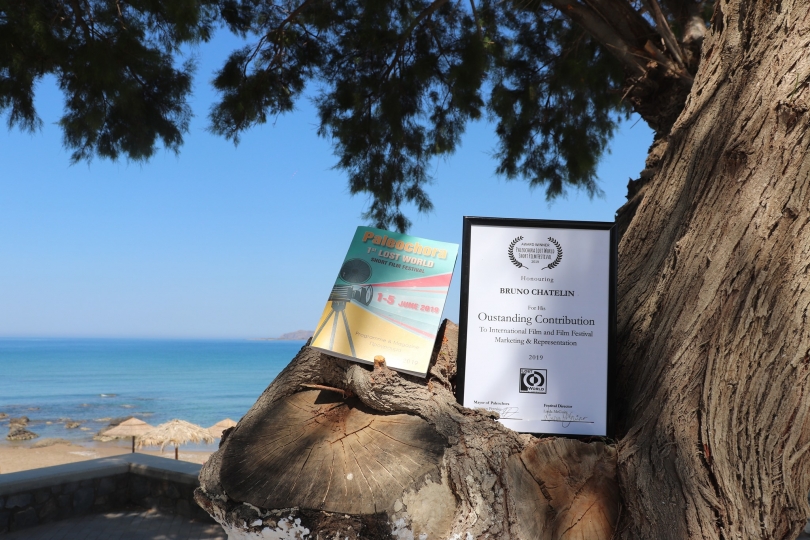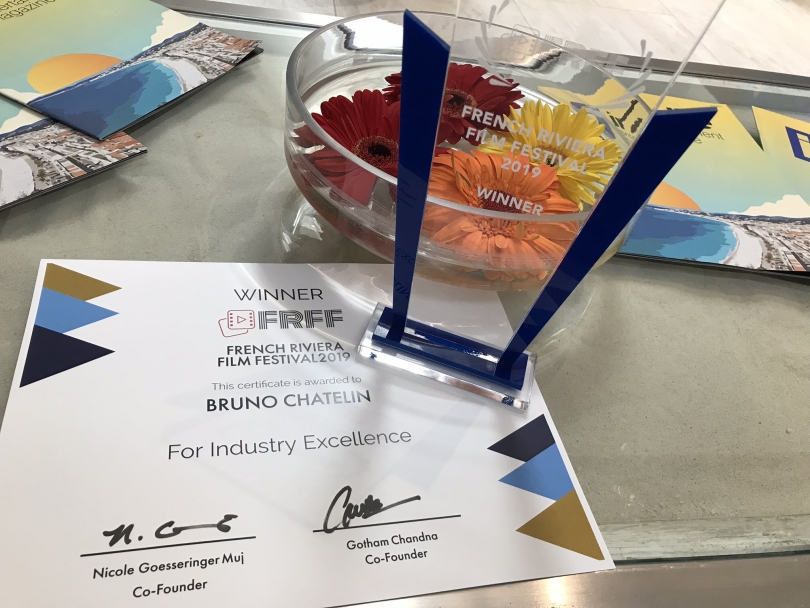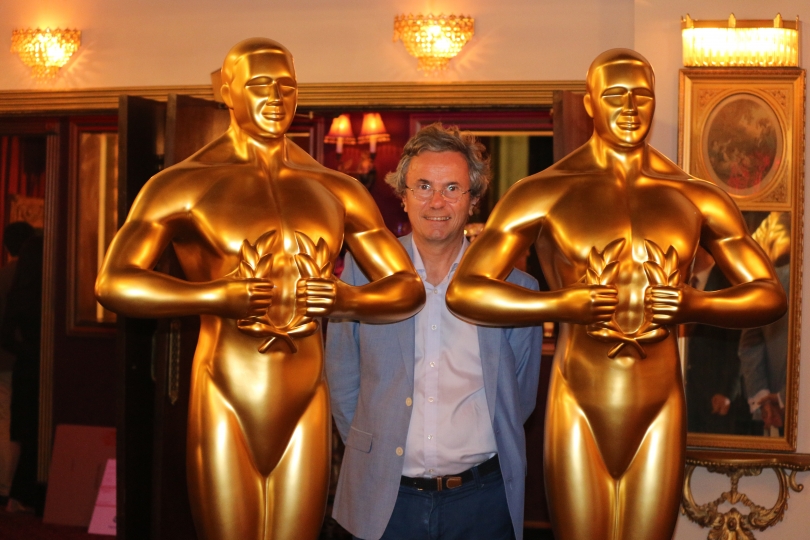The UK's leading
casting agent discusses "The Name Problem," and why she hates the
title "casting director."
Mary Selway is
the UK's leading casting director. Starting with If it's Tuesday, This Must
Be Belgium in 1969, Mary went on to cast features for Spielberg (Indiana
Jones and the Temple of Doom, Raiders of the Lost Ark), Ridley Scott
(Alien), James Cameron (Aliens), George Lucas (Return of the
Jedi), Michael Apted (Gorillas in the Mist) and Roman Polanski (Tess),
alongside prolific films such as Superman, Flash Gorden, Juggernaut,
Notting Hill, Lost in Space, Withnail and I, Death and
the Maiden, Emma, Onegin and Out of Africa.
With such a vast volume of respected films in her portfolio, there were few
surprised reactions at the BAFTA awards ceremony last week when Mary was awarded
The Carl Forman Award for Outstanding Contribution to British Cinema.
Tony Pomfret spoke with Mary in her office in Twickenham Studios about
the role of the casting director, actor negotiations, the pressure to get names
and the predominance of women in casting.
Where do you come in during the making of a film?
You're asked, by the producer or director, if you would like to cast whatever
the film is. You then read the script, meet the director, and discuss his concept
of the film, and have a long discussion about the sort of actors he likes. Then,
what should happen is you go away and think about it and come up with lots of
lists of suggestions, and you talk to him about those, and you set up meetings.
You do readings, sometimes on tape. You read with the actor, sometimes you bring
in somebody else to read with them, sometimes the director wants to read. Then
you -- well, the director -- makes the decisions and you have a lot of input
there. You
have to negotiate the contracts with the agents, having worked on the budget
with the production people, then you get out what is called a Casting Advice
Note and the contract is made up from that.
Having said all
that, what actually happens is that, in the beginning, there's usually a huge
tussle that goes on because every film, sadly, no matter what the budget requires
a name, and that is now the nightmare of casting. Apart from names it's a very
enjoyable business and it's very interesting and very creative. The name problem
that has arisen now is deeply tedious and so you have to strike the balance
between getting a name for the distributor and keeping the integrity of the
film.
You have mentioned casting, how far does that go?
You get a schedule and start talking to agents. They will already have a sense
of the size of the film, so if it is bigger or smaller than it appears to be
you have to guide them, but when you get the schedule you work out the budget.
Then you talk to the production people again and say 'do you think we should
contract in this way, or in this way?' and you decide what would be the best
way to contract. You don't know what other production problems there are, there
may be weather cover, so it may appear that an actor is only on for two weeks
but they may be wanted for six weeks, and then you start negotiating with the
agents. If they say, 'no', you then go back to the producer and say they won't
do it unless it's this much.
There is a skill
to how you present all that to an agent at the beginning of negotiation. You
need to save as much as you can for the production, because it is always needed
elsewhere, and yet still be fair to the actor. That part of it is all just common
sense, it's just that people make a great fuss about it. Then you get what the
Americans call a Deal Memo, we call it a Casting Advice Note, and that sets
it all out on paper. If it's a lawyers contract it takes forever and it's 15
pages, but one of our contracts, what is called an Equity Contract, is just
a simple form, so you can go straight to contract. I fight to keep the Equity
Contract.
Many producers
don't want to use the it because it sets out the amount of break between calls,
and how many hours of the day you work before you go into overtime. It's the
difference between cowboy companies that are ripping off the actors and making
them walk to the location and the ones that are trying to treat them well but
have only got a limited amount. You know the ones you can trust, usually.
What are the best and worst parts of the job?
The people employing me should understand my tastes, and that very rarely happens.
People just think: "Oh, she's got a lot of good credits, she'd be fine for that
film." I'm actually better at some films than I am at others. You can have a
negative power, where you can say to agents: "No, they're not right, I am not
bringing in that actor." What I say, in that situation, if I don't think an
actor is right for the film is "I don't think this guy is right, a lot of people
like him, but he doesn't appeal to me" because it's all subjective. You have
to be fair, and open minded, and it's really hard, because the problem is there
are thousands and thousands of actors and the drama schools push out more and
more and more actors.
If you speak to
any casting director, and they're honest, they'll say the primary emotion you
feel is guilt, because you cannot know all of them. It is an absolute impossibility.
They say the top agents have the hold on the top talent. In a sense they do,
but there are always the emerging actors who haven't got to the top agents yet.
You have to be aware of those. It's a full time job to keep up with all that.
There is this thing where you read a part for "fat ugly bloke" and you think
"Oh, there's that bloke that I saw do 'fat ugly bloke'" and you can repeat easily,
but what you should do is find that guy, but find other ones as well. Sometimes
there is an inverted snobbery that the director doesn't want him because other
directors have used him and that's silly if he's the best person. But it shouldn't
be just because he always plays those parts. It should be who is the best person.
You are not to be lazy.
As for the title 'Casting Director', that's rubbish. I don't know what I direct.
I direct in here, in my little office with my video camera and I get actors
to do a scene, but the director directs the movie. I hate the term Casting Agent.
I loathe that. An agent represents actors, guides their career, gets them work
and takes ten percent of their salary. I get paid via a production company to
sign the best actors. What am I an agent for? People constantly nowadays call
you a Casting Agent, and I hate that even more than Casting Director. I would
prefer simply: Casting Person or Casting. Unisex Casting Person.
If you're a writer or a director, or you're involved creatively in film, it
usually takes a very long time for your work to come to fruition. In here you
see somebody that you think, "Oh, they would be great for that role", and they
come in to meet the director and the director goes "Oh, that's great, great"
and they get the job. That's fantastic, because you've done something for the
actor that is to do with their career. It's a terrifically fulfilling thing
when that happens. The worst thing is having to deal with all the bullshit that
you get from agents and everybody, and the unbelievably boring, stupid amount
of gossip told to you as fact. That drives me insane.
Casting seems a very female oriented occupation
I know. You look
in Contacts and it's ridiculous. It isn't the case in America, so much.
I don't know why it is over here. I think it's because women are better at dealing
with emotion in many different forms, and are very articulate about emotion
to actors. Women are less confrontational for directors and so better at guiding
them. They're not competitive in the same way as men, and casting should be
uncompetitive and lacking in ego and I don't know if I could actually put my
hand on my heart and say that's true of a lot of casting directors. You have
to become very simpatico with the director and I think that women are able to
do that in a very non-threatening, guiding and gentler way.
How would you advise someone wishing to go into casting?
Watch lots and lots of films, European, American and English films, and go to
the theatre. I don't mean West End Theatre, I mean go to fringe theatre, small
theatre all that sort of thing. So when they come to me, or another casting
director and say "I would love to work in casting" they have a knowledge to
start from. The problem with casting is that anybody can do it, but to do it
really well is very, very difficult. Anybody can have the knowledge, but it's
how you apply that knowledge. Some people can work for years and not have it,
and it's hard to tell them they haven't got it.
Related Articles
BAFTA
Awards

 Chatelin Bruno
Chatelin Bruno 




























